Rehabilitated penguins
The Flood Chicks
This is the true story of Maureen, Aunty Dot and TK Pink; three little penguins who survived a Cyclone.
On the 15th of December 2021, Tropical Cyclone Ruby - after causing havoc in other Pacific Island nations, arrived in Aotearoa New Zealand. Ruby made her way down to The Wildside, a series of Small Isolated bays on the South-eastern corner of Te Pataka o Raikiahautu/Banks Peninsula. Here she let rip and dropped over 300mml of rain within 24 hours. That’s a lot of rain!
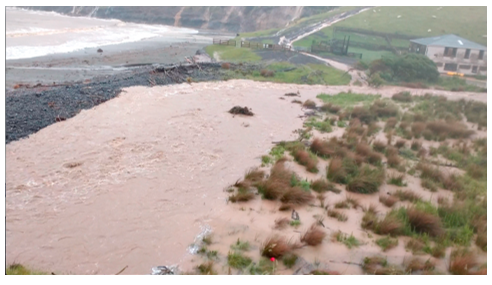 |
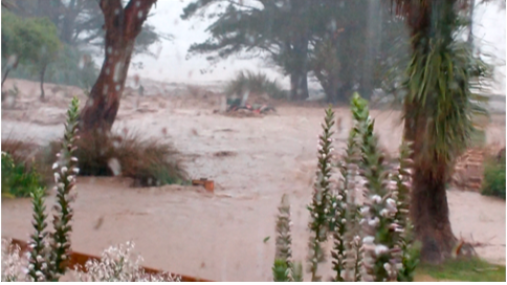 |
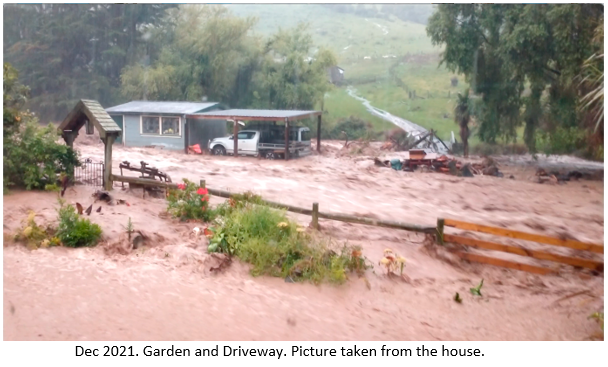 |
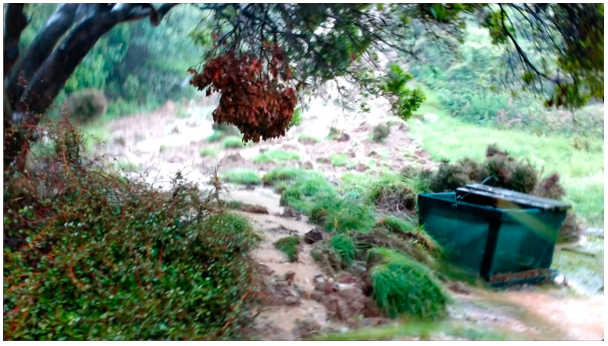 |
Shireen called up some of the team. Pōhatu Penguins Nature guides, Kev, Ave and Mark. She said they might need some help and that Farmer Dan (her son), was already out rescuing stranded sheep and checking on penguins. They had already lost a few of the predator control traps to the swollen creek - which had swept them away to sea. She was worried about some of the penguin nest boxes near the creek with the rising water.
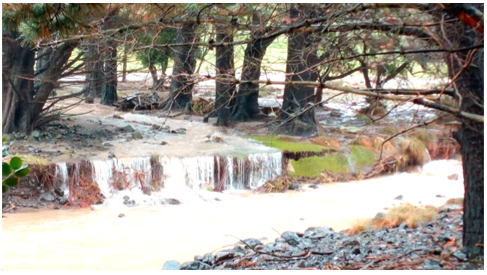 |
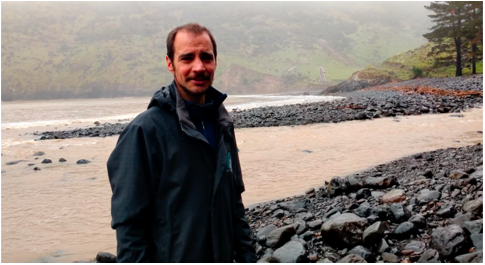 |
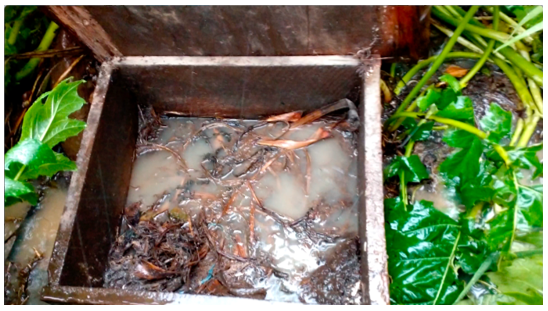 |
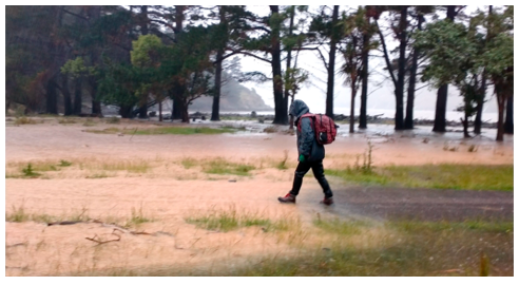 |
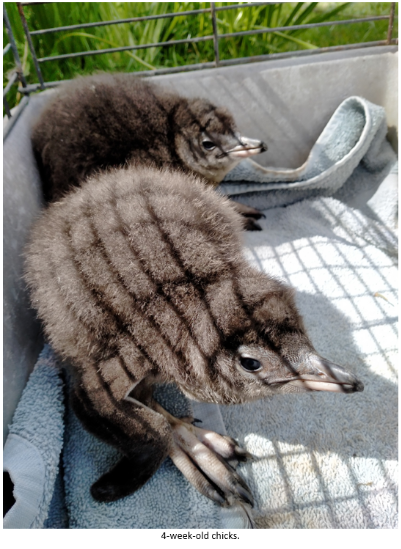 |
|
Penguin chicks were brought into the kitchen. Francis had just freshly painted the wall that day and now there was penguin poop on it! No one had any idea how bad this storm was going to be, the weather forecast hadn’t alerted them to this kind of level. Everyone watched from the veranda as the water rose and entered the garden.
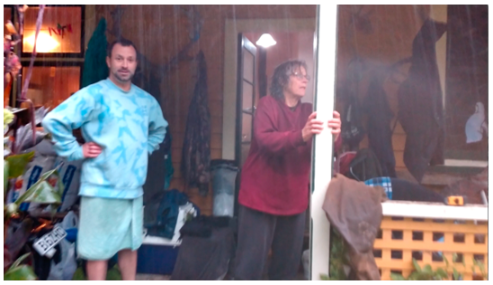 |
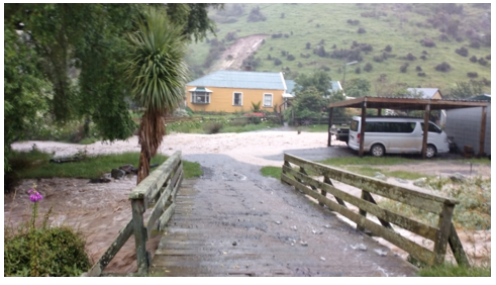 |
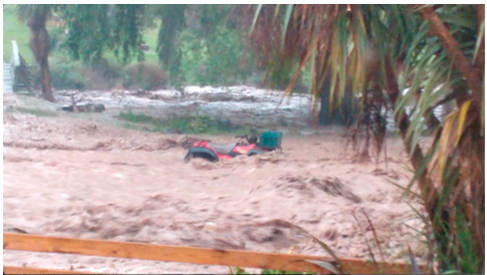
Cyclone Ruby had local people cut off from the outside world, with no electricity, no phone reception, no running water and road access in places was blocked... Landslides, rockfall, roaring winds and raging flood waters trapped the Wildside's isolated communities where they were, some in major trouble - were being evacuated by helicopter.
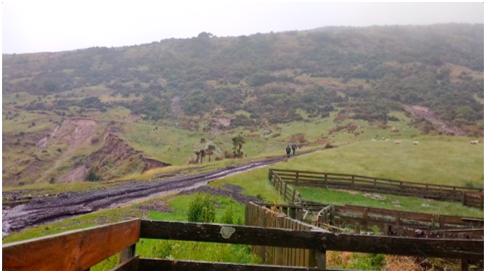
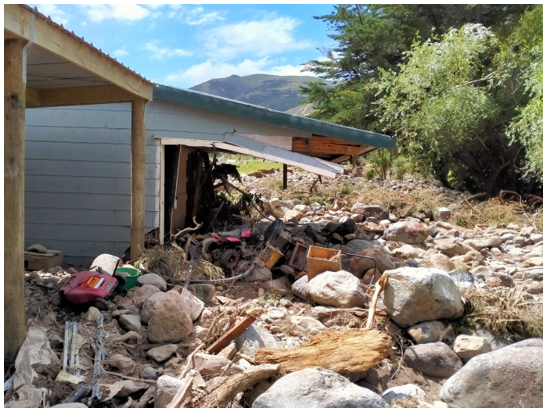
5 am, the rain had completely stopped, and the morning sky was a dim grey with low clouds obscuring the hilltops. Waterfalls were coming off the hills everywhere. And landslides had cut gashes down the hillsides taking out chunks of native forest and farm fences with it. The team decided to start early and go out on a scouting mission for any more chicks or sheep in trouble. The garden and driveway area where they had rescued all the chicks the evening before… was completely wiped out. The nest boxes were nowhere to be seen, washed away to sea. It was a good call bringing all those fluffy chicks in, but now they had nothing to put them back into and no rehab area.
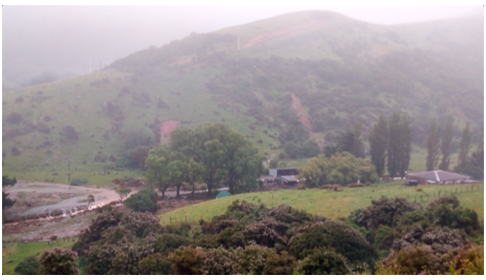
By some miracle, the house still had internet. The landline phone was dead, but the team could message over Facebook. Other members of the Pōhatu family team, as well as Doc and some of the Pest Free Banks Peninsula crew, were on their way to assist.
By Lunchtime the Doc and Pest Free Banks Peninsula trucks arrived, but… they were stuck way up the road, multiple landslides were blocking them from driving down to the bay. Everyone hiked down with carry cages for penguins. They had to wade through the creek/river as the bridge was destroyed.
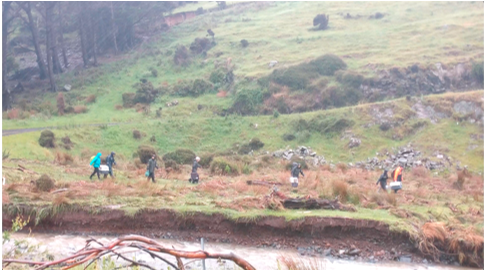 |
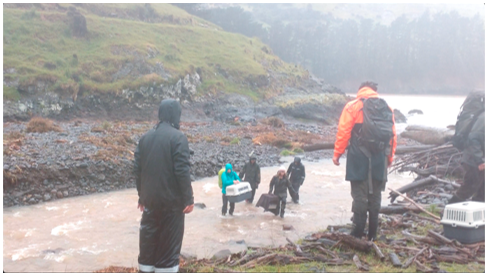 |
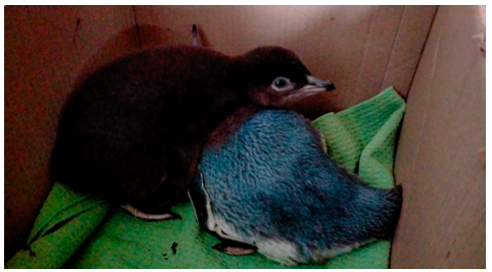 |
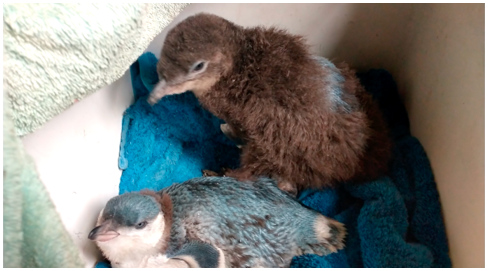 |
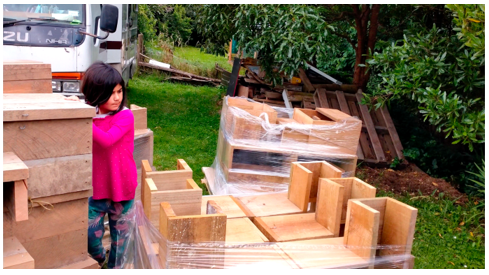 |
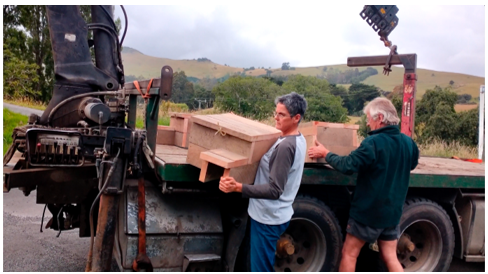 |
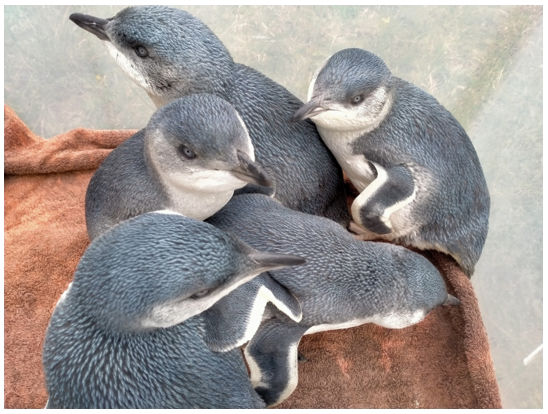
The rebuilding of Pōhatu took a long time, the bridge was a ruin for over a year with no access but for driving the 4x4 wheel drive through the creek and on rainy days the only option was to walk a small bridge that could only hold one person at a time. The farm had lost its garage, which was also the workshop where all the important tools were kept. Penguin nest boxes were found washed up on Sumner and Brighton beaches in Christchurch City, all the way around the coast, far away from Pōhatu. The Quad bike was discovered floating off the coast with several different reports of it bobbing around in different random locations, eventually being salvaged by the Ecan clean-up team. The boat was found punctured and almost sunk near Lyttleton Harbour, 19 nautical miles away from Pōhatu, where a local fishing boat had luckily rescued it.
With all the kind donations and the community coming to help, the penguin habitat areas on the farm were rebuilt and made safer with nest boxes built up on mounds and away from the creek. Life started to go back to normal.
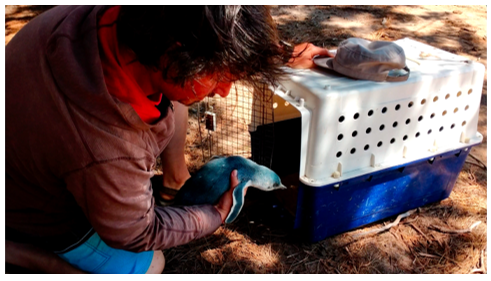 |
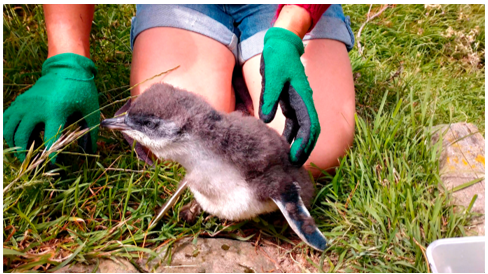 |
2023 -The season for penguins started in the winter months, with adult penguins prospecting for new nest boxes or spring cleaning and claiming their old ones. The Pōhatu research team now certified to microchip penguins and track at sea - were monitoring the nest boxes, seeing who was who and what they were up to, the beginning of a 10-year breeding biology and demographic study to join with the tracking at-sea marine habitat study.
Some of the adult penguins had been microchipped. Lucy and Ave were on duty one winter day when Lucy scanned a bird whose ID number didn’t look like one of the ones that had been chipped in Pōhatu. They sent the number to Rachel the head scientist and she found out from the bird banding office that it was one of the flood chicks. One of the seven that had been raised by Kristina and Thomas at Christchurch Penguin Rehab after the 2021 flood. It was the first re-sighting of a rehab bird since microchipping was being done.
The team were so excited. Kristina and Thomas told them its name was Pink as they always fed it from the pink plate. Each chick had its allocated dinner plate.
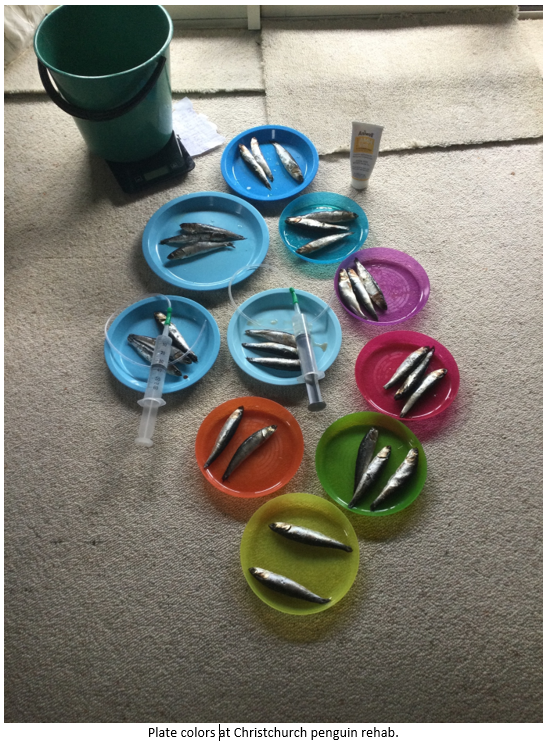 |
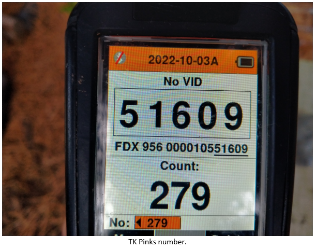 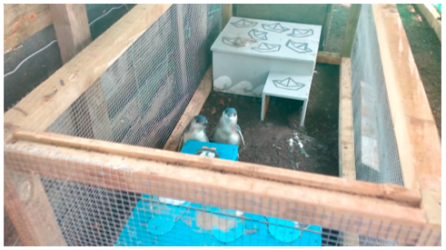 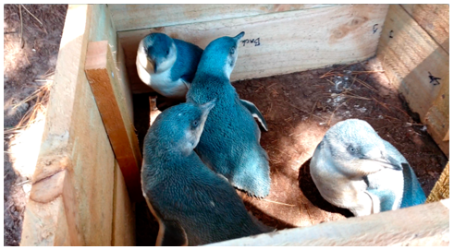 |
He was renamed TK Pink after Thomas and Kristina.
TK Pink with his partner had two cute fluffy chicks!
Later on, in the season, the monitoring team was surprised by some late breeders -when a brand-new nest box (which had been placed upon a mound next to the garden path) had a new penguin couple move in. All the boxes in the garden had been replaced after the flood and all the penguins had moved back in, with a few new boxes for them to choose from. This new penguin couple was scanned, and again, showed an ID number the team didn’t recognize.
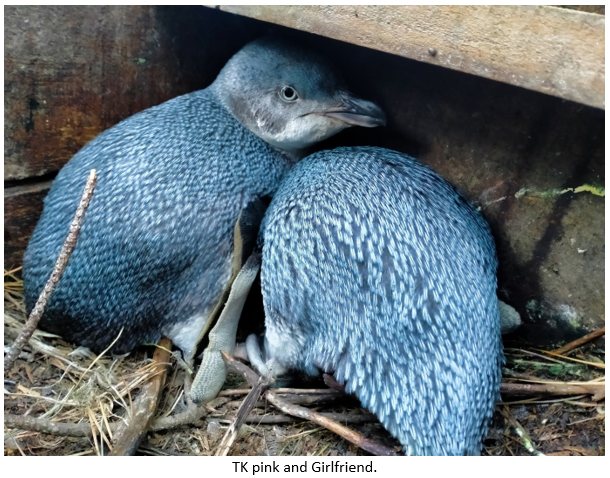
The new box was adopted by Kaitlin one of the students doing her master’s study in Pōhatu and working as a nature guide. She named the penguin couple Maureen and Leo after her Grandparents. Maureen was the flood chick, Kristina and Thomas had called her Orange while she was in rehab (she ate from the Orange plate). So, Orange was now Maureen.
The couple had a nice new nest box where Maureen laid two eggs. Leo and Maureen took turns sitting on the eggs to keep them warm until the last week of incubation (about a month). This had the monitoring crew very confused. They found a bird sitting on the eggs with an ID they didn’t recognize, they scanned it several times and couldn't understand why a random bird would be incubating someone else’s eggs. Again, they found out it was another flood chick. This one Kristina said was named Yellow (it had the Yellow plate).
Yellow and Orange arrived in the same carry cage to Christchurch Penguin Rehab after the 2021 flood event. Kristina kept them together, raising them in the same hutch in the rehab centre. TK Pink was their neighbor in the hutch next door. Yellow and Orange were both fluffy and around 4 weeks old, so Kristina believed they were siblings. It all started to make a bit of sense for the team.
Orange was renamed Aunty Dot after Kaitlin’s other Grandma. Leo, Maureen and Aunty Dot were taking turns over the season. Aunty Dot was monitored several times guarding the chicks. She was seen snuggled in with them even more than the actual parents were.
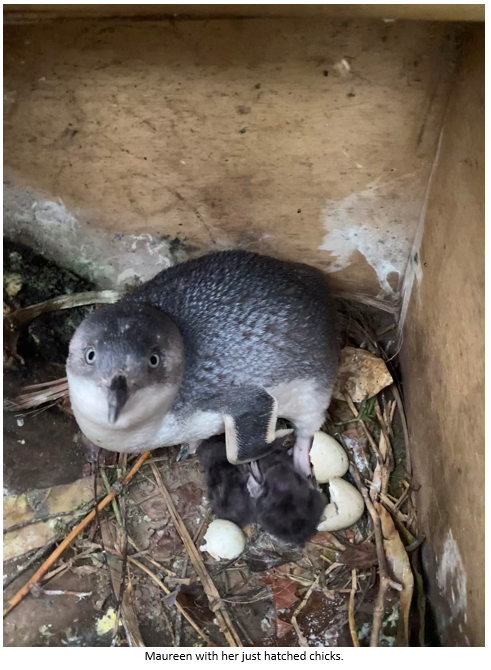
|
Ideally, we don’t want to handle our penguins at all. However, some of them need our help whether it be from an injury, illness or malnourishment. Pohatu Penguins steps in and gives these little birds a second chance at life! Most of our rehabilitated penguins are underweight or malnourished chicks. Typically, we find these chicks during our tours as we monitor the nesting sites. Why are the chicks malnourished/underweight?
What do you do in rehabilitation? This depends on the penguins needs and condition. Typically we will feed them 2-3 times a day depending on their weight and age. If they are old enough we will bring them for a swim in our “swim therapy pool”. Here, we introduce them to the water and determine if they are ready to be released. Injured or sick penguins will be sent to either a specialized penguin vet or dedicated specialists, Kristina and Thomas*, in Christchurch where they are assessed for future placement. Permanently injured penguins have the chance to live out their lives at the Antarctic Centre. *K&T Link: https://www.stuff.co.nz/environment/88518082/christchurch-couple-give-injured-rescue-penguins-the-full-pamper-treatment ParniaI spotted Parnia while kayaking; she was standing on the rocks looking extremely thin and weak. After getting back onto shore I quickly grabbed a bucket and went on to retrieve her – she gave little resistance to capture. Once I saw her up-close I realized that she had a deformed beak, probably why she had been so thin. (It’s very difficult for penguins to hunt efficiently with a crooked beak, most die.) I had never seen such a thin penguin and I expected her to die within the day, but still it was worth a shot to try and save her. Penguin band: P 41 087One year a starvation event happened right in the middle of the breeding season. When starvation occurs parents stop feeding their chicks to save themselves or only do so periodically. Chicks are then forced to leave (or fledge) the nest early in search of food. Unfortunately, chicks under 8 weeks old are not properly equipped to survive at sea and either starve or drown. In order to prevent early fledgings I fed the chicks while they remained in their burrows, hoping that the starvation event would end soon. Slowly but surely the parents started to return consistently feeding their youngsters and relieving me of my duties! Two years later P41 087 (we used to band our penguins) turned up in one of my breeding boxes. He was one of the largest, most beautiful penguins I had ever seen. P41 087 was evidence that my feedings, two years ago, had been a success. It warmed my heart to know that I helped save this little penguin and build him up for a healthy, successful life in the wild. He was my pride and joy. RoxyRoxy was handed in by the Fox II, a tourist sailing boat in Akaroa. She was extremely thin with a severe injury to her eye. Roxy looked like a recently fledged chick that seemed to have been hit by a boat. Her condition was very grim and I had my doubts about her survival.
However, to my delighted surprise she survived the first 24-hours, then the next and the next, and by day 3 she was on the road to recovery! Her eye injury, however, would be permanent and she would never be able to see from it again. Although, she was doing well in rehabilitation we knew that she wouldn’t stand a chance in the wild, thankfully, Roxy was also sent to the Antarctic Centre where she’ll live out a long and luxurious life! Shark baitThis is an all time favorite story that demonstrates incredible intelligence – intelligence you would never expect from a penguin. One night, while running an Evening Penguin Tour, we found a horribly injured penguin beside the track. I immediately took him into care and the next morning rushed him to Christchurch for an emergency veterinary assessment.. He had several shallow, flesh wounds and a lacerated leg. We suspected the culprit had been a shark. The vet stitched him up and I took him home to recover.. He spent a few weeks with us recovering and eating lots of fish – something he was quite happy to do through his moult*! Once his moult was complete we returned him to the sea and he happily shot off like a rocket! One year later, while running a tour, in the same spot on the tarck out in the open, we found a penguin near the track and out in the open we found a penguin that did move away from us as he should. He also did not attempt to bit and was very relaxed when I picked him up to examine him to find an explanation for this strange behaviour. He was in very good condition, but lame in one leg as Shark bait was when we released him. He proved beyond doubt who we was when I tried to feed him. He snapped and gulp the fish down gleefully and then looked for more, greedy as ever. As he was looking forward to another free easy loading molt we decided to indulged him and sent him on his way, fat and sleek once his feathers were grown in. Once again he shot off, instantly a wild penguin, but we did wonder, would he be back next year for another easy moult*? *Little Penguins moult – loose their old feathers and grow new ones – for two weeks every year. During the moult they cannot hunt and thus starve until it is complete. Yappy WiggleThis was the funniest penguin I’ve ever cared for! One day, while monitoring nesting sites I came across a burrow with one healthy chick and one very small runt. If one chick gets too far behind they simply die and the fouled nest can cause the healthy chick to become sick and die. The best option was to take the runty chick out, but then what to do with it? I decided I would simply throw it in the bushes. It’s very difficult to raise chicks that are less than 2 weeks old, especially if they are runts, but I thought I’d give it a go. Trying to feed such a young chick was not easy, but the little guy responded well and started to put on weight. Soon enough he turned into a healthy, respectable penguin. He became far too tame, however, and ran around like a puppy dog, wiggling his tail and begging for food with sharp, yapping noises. When it came time for him to leave he wasn’t exactly keen. On the first release he returned the next day yapping his way up the drive, begging for more fish. He had obviously not found any for himself. I allowed him to stay for a few days until I figured that we better try again; so, for a second time we released him back into the wild. He returned the very next day for more fish. I fed him once more and came up with a new idea, we’ll release him by kayak! So, in our third release, we took him by kayak to the entrance of Flea Bay and let him go. This seemed to be successful until the fifth day when we saw him hobbling towards the house. This time he was much weaker, thinner and a bit injured. I assumed he had hurt himself along the rocks and barnacles while exiting the sea. After our third try, we realized that Mr. Yappy Wiggle had imprinted on us and would not succeed in the wild. He now happily resides in the Antarctic Centre yapping and wiggling all over the place! Our Christmas Eve SagaBefore you read this you must understand: Yellow Eyed Penguins are the rarest penguin in the world and are extremely endangered. Every single one is precious. One Christmas Eve during a penguin tour we saw one of our Yellow Eyed Penguins drag itself ashore, obviously injured and bleeding. We caught the Yellow Eyed to gauge its injuries in which its feet were badly cut. It looked as though it kicked itself free from the jaws of life and escaped a near death shark attack. It needed stitching as soon as possible if it was to survive, but what vet would be open on Christmas Eve or Christmas Day? Talk about bad timing. I rang our closest vet in Little River and to my surprise he said to bring it straight over. This was 10.00pm on Christmas Eve. We arrived in Little River at 11.30pm, but the vet was nowhere to be seen. We sat there waiting and silently panicking over this precious penguin’s life. Until suddenly a vehicle pulls up with the vet and vet’s family! In order to successfully and painlessly stitch the penguin he needed to be put under. However, this can be dangerous if the penguin has a full stomach – something we weren’t sure about. We simply had to hope for the best and move forward with the procedure. The penguin did not fair well with the gas, he kept drifting in and out of conscious. Then, suddenly he started to heave and projectile vomit fish across the table, the floor and even the walls! Now, you can imagine our surprise, you can also imagine that it was quite unexpected and unfortunately we did not have time to react. So, like the table, the floor and the walls, we too were covered in fish vomit. Merry Christmas indeed! Thankfully after loosing its stomach contents our Yellow Eyed Penguin drifted into sleep and the vet was able to finish the job. With stitched and bandaged feet we placed our groggy penguin back into our vehicle. As we had to get the penguin home our vet and his family had to clean up the fish vomit – lucky them! We bid farewell and wished our Christmas heros a very Merry Christmas. After Christmas I sent the penguin to Christchurch to my wonderful friends and penguin rehab specialists, Christina and Thomas. Once it healed properly we released our Christmas penguin back into the wild. |
 Feeding chicks Feeding chicks Rehabilitated penguins in our garden going for a walk  Swim! (allow the penguins to oil up their feathers)  Releasing an adult.  Two chicks ready to go! (White flippered and Little Blue)  Trying to release Yappy Wiggle.  Still trying to release Yappy Wiggle...  Yellow Eyed Penguin with stitched foot.    |
|
These are just a few of the more memorable birds we have had in care. We rehabilitate many penguins, mostly Little Penguins, sometimes Yellow Eyed and occasionally a Crested Penguin. Most are sent off to sea successfully! If you too wish to help visit our Adopt a penguin page. |


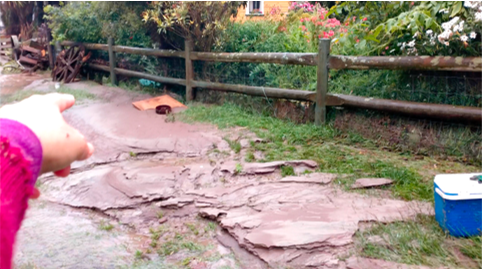
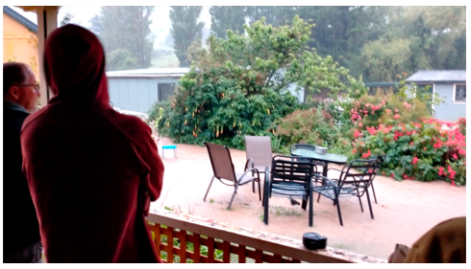
Comments